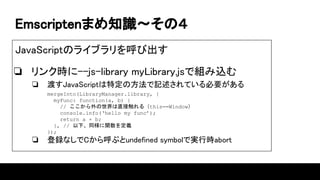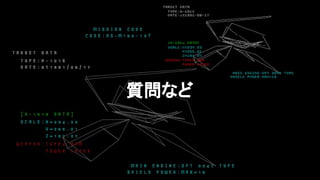Oh! java script 夢の続きを語ろうよ?emscriptenの逆襲
- 3. 知ってますか? ● なぜか 編集部が作ったゲーム ○ 創刊10周年記念 PRO-68K に収録 (雑誌付録ディスク) ○ 編集部制作の強力インフラ ■ MAGIC2 - 3D描画ライブラリ ■ Z-MUSIC - サウンドドライバ ○ ゲーム自体、普通に面白い
- 4. 実演 原作@エミュレータ
- 5. あれ?ショボい! 256 x 256 ドット 16 色 ワイヤフレーム ? ? ? んじゃ、高解像度化しますか
- 7. 原作をウェブで Powered by Emscripten run68 (in C) sion2.x (Binary for X68k) 実行 JavaScript VM 実行 互換レイヤー (in JavaScript) DOS/IOCS MAGIC Z-MUSIC GVRAM I/O <iframe> zmusic.x (Binary for X68k) 非同期RPC化 ここで気合 ハイレゾ化するぞ! X68Sound.dll (in C++) run68 (in C)
- 8. 高解像度+16:9化 256 pixel 256 lines ピクセル アスペクト比 4:3 1080 lines 1440 pixel 4:3 1920 pixel 16:9 アスペクト比補正+ベクトル拡大 +本来見えていなかった部分の表示 ワイヤーフレームは楽勝
- 9. ビットマップ文字のベクターフォント置き換え 一部の文字(4×6サイズ)が画像だった ● 仕方ないのでGVRAMのアクセスパタンから文字推定 { “111010101110101010100000”: 64, ... } 文字コード64 A
- 10. 内部で使ってる主な技術 ● HTML5 Canvas(2D) ○ WebGLは使わずにJavaScriptで座標変換計算 ● Web Audio API ○ FM音源と音響処理(リバーブ) ● Web App Manifest ○ モバイルでホームスクリーン追加 ● Gamepad API / TouchEvent ● WebFonts
- 11. Emscriptenまめ知識?その1 描画ループにrequestAnimationFrameを使う ? emscripten_set_main_loop()を使いましょう void emscripten_set_main_loop(em_callback_func func, int fps, int simulate_infinite_loop) ? fpsに0を指定するとrequestAnimationFrameが使われる ? それ以外の値だとsetTimeoutを使うので注意 ? 失敗談:知らずにsetTimeoutを書き換えて中からrAF呼んでた ? simulate_infinite_loop=1でこの関数から戻らない
- 12. Emscriptenまめ知識?その2 常駐するサービス?ライブラリを作る ? emscripten_exit_with_live_runtime()で常駐 void emscripten_exit_with_live_runtime(void) ? ひとまず実行終了 ? ただしatexit()系やリソース解放処理は走らない ? JavaScriptからC/C++の関数を継続して呼び出し可能 ? 空のmain()から呼べば共有ライブラリっぽい物が作れる
- 13. Emscriptenまめ知識?その3 JavaScriptから呼び出せる関数を(確実に)作る ? リンク時に-s EXPORTED_FUNCTIONS="..." ? "..."にはmainを含めた関数のリストを渡す 例:"['_main', '_myAPI1', '_myAPI2']" ? 関数名は"_"のプレフィクスが付くので注意 ? 数値以外は直接渡せない点に注意 ? C/C++側のメモリ空間はModule.HEAPU8等でアクセス ? Module.cwrap()やWebIDL-Binderなどの道具はある
- 14. Emscriptenまめ知識?その4 JavaScriptのライブラリを呼び出す ? リンク時に--js-library myLibrary.jsで組み込む ? 渡すJavaScriptは特定の方法で記述されている必要がある mergeInto(LibraryManager.library, { myFunc: function(a, b) { // ここから外の世界は直接触れる(this==Window) console.info(‘hello my func’); return a + b; }, // 以下、同様に関数を定義 }); ? 登録なしでCから呼ぶとundefined symbolで実行時abort
- 15. Emscriptenまめ知識?その5 実行開始を遅延させる ? preInit内でaddRunDependency()を呼ぶ ? 対応するremoveRunDependency()が呼ばれるまで待つ ? WebFonts読み込みを待つ例 preInit: function() { Module.addRunDependency("fonts"); document.fonts.ready.then(function() { Module.removeRunDependency("fonts"); }); },
- 16. 质问など

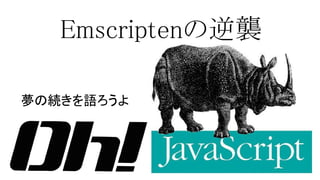
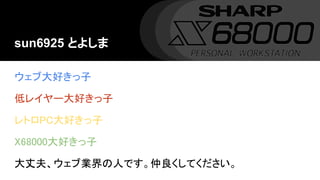
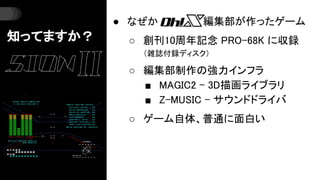



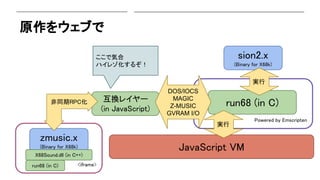

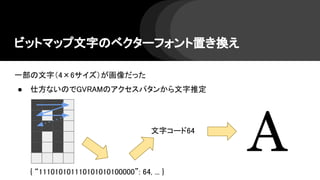
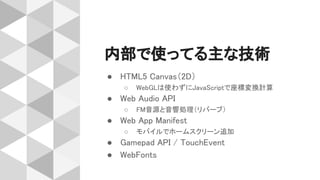
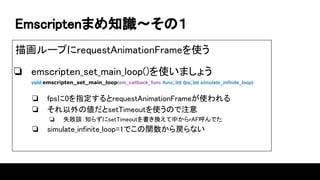

![Emscriptenまめ知識?その3
JavaScriptから呼び出せる関数を(確実に)作る
? リンク時に-s EXPORTED_FUNCTIONS="..."
? "..."にはmainを含めた関数のリストを渡す
例:"['_main', '_myAPI1', '_myAPI2']"
? 関数名は"_"のプレフィクスが付くので注意
? 数値以外は直接渡せない点に注意
? C/C++側のメモリ空間はModule.HEAPU8等でアクセス
? Module.cwrap()やWebIDL-Binderなどの道具はある](https://image.slidesharecdn.com/ohjavascriptemscripten-161221150646/85/Oh-java-script-emscripten-13-320.jpg)
